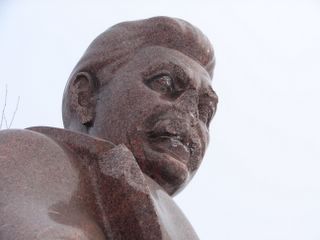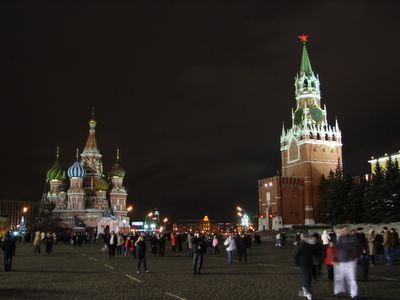Heavy Lifting
Everything is sort of an adventure for me here, and if taken the right way a little bit of a learning opportunity as well. Perhaps being in an alien environment makes me more reflective, since I’m certain I haven’t become more insightful. Regardless, I’ve been having little flashes of cognition that add up to a better understanding of Russia. Sometimes they’re based in conversation or observation. But this weekend I had a physical lesson.
The metro here is relatively accessible. Most of the stations, in the center of town at least, are serviced by banks of escalators. But once inside the actual stations, you often face a few staircases in order to transfer from one line to another. It’s not really something you notice until you try to do it with luggage.
The other day, I was making just such a transfer. Halfway down the staircase from the Kievskaya blue-line station to the circle-line Kievskaya station, I noticed a nice-looking little old lady with a suitcase. People were streaming by her as she struggled with the bag; a rolling upright nylon suitcase with a retractable handle like everyone has nowadays.
As I approached her, I smiled and grabbed hold of the handle. I was quite proud of myself for proactively helping, but even more so for my correct usage of the formal polite-form, or second person plural, of the verb in the imperative. Well, I’m pretty sure I said the appropriate phrase (“Permit me”) and since she didn’t react in horror or shock, let’s just assume that it came out close to the right thing.
Sometimes, in extreme cases, there’s a window of clarity; a brief moment in which all the power of a person’s brain comes to bear on a situation and analyzes and assesses every tiny input in split fractions of a second. I now had the suitcase by the attached handle, not the retractable one for dragging, and I was quite certain that it was the heaviest thing I have ever tried to lift. Something in the luggage clunked gently with the sort of thudding that lead bricks would make. A gentle clunking, since it was apparent that the bag was densely packed with whatever was making it that heavy.
In that brief moment of clarity, I began to assess my odds of making it down the stairs safely. And they didn’t look good.
But it was already too late. The old lady was smiling broadly, a toothy golden smile, and going on about how polite I was and what a gentlemen I was and how rare all of it is in today’s society. Of course, I tried really hard not show how much I was struggling. I tried to chat a little, but the bag was throwing off my balance, and painfully banging against my leg. Unfortunately, I skittered down the crest of the last two steps, landing noisily in the middle of the platform. The only thing that prevented me from falling is that the suitcase landed first and was enough of a counterweight to stop my bodily momentum.
She thanked me again, grabbed the still-extended handle, and disappeared into the crowd. That’s when I realized that she was no ordinary old lady; she was a real Russian babushka.
A babushka (pronounced BAH-boosh-ka) is the stereotypical little old lady in a long coat or housedress with a kerchief around her head. She’s more than happy to give directions or share advice on nearly any topic. She’s pretty friendly and approachable in that way, and very unlikely to be drunk (a real consideration sometimes when looking for help on the street). She might engage you in conversation that may be difficult to end, but it’s not unpleasant.
But don’t let the babushka fool you. After a lifetime in Russia, they are absolutely as tough as nails. They will yell at you loudly for perceived transgressions of order or decorum, order you about like pieces on a chess board, or take on the surliest drunk on the metro. It’s nothing to be elbowed aside easily by one on a tram, and then notice that she has a 50 lb sack of potatoes over her shoulder.
More than that, the babushka is the real foundation of Russian society. They staff all the public places as “duty officers”, keeping watch on lobbies, escalators in the metro, and apartment buildings. They look after the grandkids while the parents are at work. And, in no small sense, they help maintain public order with their outspoken opinion of what’s right and wrong.
So, given all that, I’m glad that I lent a hand to the babushka. But someone please tell that old lady: next time, she’s own her own.










